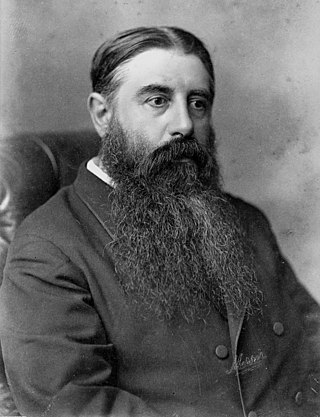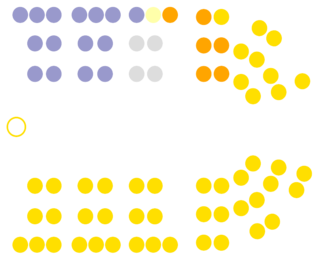Related Research Articles

Sir Julius Vogel was the eighth premier of New Zealand. His administration is best remembered for the issuing of bonds to fund railway construction and other public works. He was the first Jewish prime minister of New Zealand. Historian Warwick R. Armstrong assesses Vogel's strengths and weaknesses:
Vogel's politics were like his nature, imaginative – and occasionally brilliant – but reckless and speculative. He was an excellent policymaker but he needed a strong leader to restrain him....Yet Vogel had vision. He saw New Zealand as a potential 'Britain of the South Seas', strong both in agriculture and in industry, and inhabited by a large and flourishing population.

Dunedin North is a former New Zealand parliamentary electorate, which returned one Member of Parliament (MP) to the New Zealand House of Representatives. It was established for the 1905 election and has existed since. It was last held by David Clark of the New Zealand Labour Party, who replaced the long-standing representative Pete Hodgson. It was considered a safe Labour seat, with Labour holding the seat for all but one term (1975–1978) since 1928. In the 2020 electoral boundary review, Otago Peninsula was added to the area to address a population quota shortfall; with this change the electorate was succeeded by the Dunedin electorate in the 2020 election.
Otago was a New Zealand parliamentary electorate first created for the 1978 election, which was replaced by the Waitaki electorate and Clutha-Southland electorates for the 2008 election. Its last representative was Jacqui Dean of the National Party.
Peninsula was an Otago electorate in the New Zealand Parliament from 1881 to 1893, based on the Otago Peninsula.
Caversham was a parliamentary electorate in the city of Dunedin in the Otago region of New Zealand, from 1866 to 1908.
Waihemo is a former parliamentary electorate in the Otago region of New Zealand. It existed for two periods and was represented by two Members of Parliament.
Waikouaiti was a parliamentary electorate in the Otago region of New Zealand, from 1866 to 1908.
The Gold Fields District electorate was a 19th-century parliamentary electorate in the Otago region, New Zealand. It was created in 1862, with the first elections in the following year, and it returned two members. It was one of eventually three special interest constituencies created to meet the needs of gold miners. All three of these electorates were abolished in 1870. A unique feature of the Gold Fields District was that it was superimposed over other electorates, and voting was open to those who had held a mining license for some time. As such, suffrage was more relaxed than elsewhere in New Zealand, as voting was otherwise tied to property ownership. Another feature unique to the gold mining electorates was that no electoral rolls were prepared, but voting could be done upon showing a complying miner's license.
City of Dunedin, during the first two parliaments called Town of Dunedin, was a parliamentary electorate in Dunedin in Otago, New Zealand. It was one of the original electorates created in 1853 and existed, with two breaks, until 1905. The first break, from 1862 to 1866, was caused by an influx of people through the Otago Gold Rush, when many new electorates were formed in Otago. The second break occurred from 1881 to 1890. It was the only New Zealand electorate that was created as a single-member, two-member and three member electorate.
Dunedin Central was a parliamentary electorate in the city of Dunedin in Otago, New Zealand from 1881 to 1890 and 1905 to 1984.
The 4th New Zealand Parliament was a term of the Parliament of New Zealand.
Sir George McLean was a 19th-century Member of Parliament from the Otago region in New Zealand.
Robert Mitchell was a 19th-century Member of Parliament from Otago, New Zealand.
Francis Dyer Rich was a 19th-century Member of the New Zealand Parliament for Otago, New Zealand.
John Lillie Gillies was a 19th-century Member of Parliament from the Otago region of New Zealand. He was from Rothesay, Bute on the Isle of Bute, Scotland.

The 12th New Zealand Parliament was a term of the New Zealand Parliament. It was elected at the 1893 general election in November and December of that year.
The 1868 Waikouaiti by-election was a by-election held on 27 July 1868 in the Waikouaiti electorate during the 4th New Zealand Parliament.
The 1869 Waikouaiti by-election was a by-election held on 27 April 1869 in the Waikouaiti electorate during the 4th New Zealand Parliament.
The 1872 Waikouaiti by-election was a by-election held on 12 June 1872 in the Waikouaiti electorate during the 5th New Zealand Parliament.
The 1873 Waikouaiti by-election was a by-election held on 23 July 1873 in the Waikouaiti electorate during the 5th New Zealand Parliament.
References
- ↑ "Waikouaiti Election". Otago Daily Times . 4 May 1875.
- ↑ "News of the Week". Otago Witness. 15 May 1875.
- ↑ "Untitled". New Zealand Times. 5 May 1875.